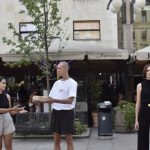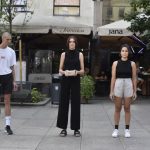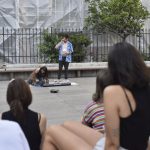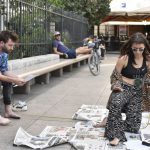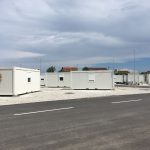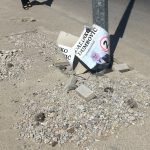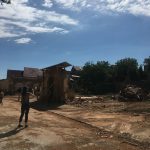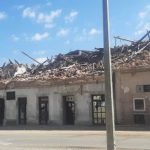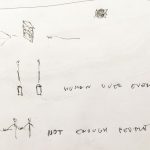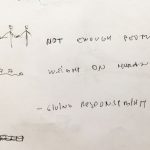Notes from Zagreb Summer Lab by Krišjānis Elviks
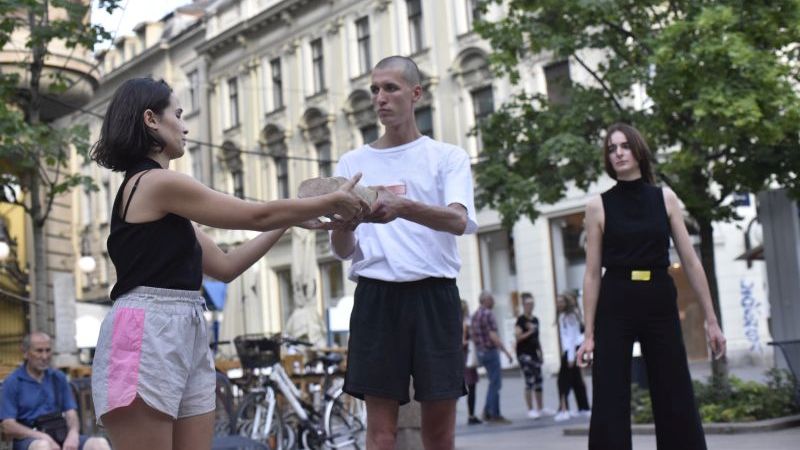
At the end of June, scenographer and artist Krišjānis Elviks went to Croatia to take part in the Zagreb Summer lab to discuss and reflect on climate disasters and the lessons learned from them.
The Zagreb Summer lab brought together various creative minds – theatre directors, scenographers, architects, sculptors, – from Belgium, Latvia, Portugal and the Balkans. At the end of the workshop, two micro performances were created in an urban environment – one where “street musicians” talk about songs that have not yet been written and eventually never get played, the other – handing over a brick found in the ruins after an earthquake, where the repetitive action does not lead to any result.
The topic of climate disasters in the Zagreb Summer lab is not accidental. In 2020 Croatia not only dealt with the consequences of the pandemic, but also experienced two earthquakes. The traces are still visible in Zagreb, but especially in Croatian regions. This climate disaster has united society, but at the same time it has highlighted its inability to react and act in crisis. Climate and its changes are undeniably a broad topic, so the focus of the laboratory was to study resilience and resourcefulness. During the laboratory, we participated in presentations, where we listened to experience stories, psychologist perspectives, visions of eco-activists – views on the present and future were heard.
We went on a trip to Petrinja, where the city functions among ruins; to a village where people who have lost their homes live in heated tin containers surrounded by asphalt and stones. During the trip, we met with representatives of various non-governmental organizations, who gave an insight into how processes are or are not coordinated, and how authorities use the resources of non-governmental sector to avoid responsibility, while allowing and forbidding society to act independently.
The topics and conversations were filled with vast spectrum of emotions and real experiences. It was clear that it would be impossible to cover the whole climate and socio-political issue in just four days. Of course, there were more questions than answers. Therefore, I will give more insight into my notes and keywords I wrote down during the workshops, which reflect on resilience, flexibility and the ability to act.
Habits
In the context of climate change and human impact, the word ‘habit’ often comes to mind. Do I question my habits? Do I act in a certain way because it is a habit or I really want to do it? I have a desire to review my own habits. It must be admitted that in the case of Latvia, unconscious eco-friendly habits have long been formed in the society due to poverty, for example, planting gardens to provide food for oneself, repairing bicycle tire chambers with a rubber patch or bringing shoes to the repairman instead of running to the store for new ones. I remember the reality of poor 1990s, when financial resources were so low that we had to struggle to fill our lives with small pleasures by acquiring new skills.
Help
The word ‘help’ in my mind creates dual feelings, because sometimes while helping someone we can do the opposite. The NGOs in Croatia try to help others with all their strength and their goals are noble, but there are also organizations that “help” in the name of other goals and with different intentions. For example, an organization that has religous goals and manipulates with people that are in difficult circumstances. Can I help? Is help always helpful? How to practice helping? Can I ask for help when I need it?
Human resources and sustainability
The government’s ignorance of dealing with the consequences of the crisis is clearly visible in the surrounding environment. Leaving Zagreb for Petrinja, you catch sight of a ruined city, where a couple of people are scratching and sorting out the crumbs. There is no workforce organized by the government. Local authorities are “cooperating” with non-governmental organizations, but in reality they are forcing NGOs to deal with the consequences of the crisis and avoid taking responsibility themselves. Enthusiasm of the people is being exploited. For how long? And how sustainable is such “partnership” if a person works without holidays, more than eight hours a day? Is the government “burning” human resources?
Victim’s perspective, atmospheric pressure
Like Latvia, Croatia has been part of the Eastern Bloc, in their case – part of Yugoslavia. Democracy and awareness of democratic processes are still developing in this country. Often the focus of negotiations is on ‘them’ (read – government or other outside factors). ‘They’ are referred as the main factors for why ‘We’ are not doing something. It is clear that looking through the victim’s perspective is relatively easy. The presence of this perspective raises questions – am I participating as an individual in democratic processes and am I fighting for democracy? Does the victim’s perspective lead to something? Perhaps it is a mixture of low self-esteem and collective trauma that increases unhappiness in our society, creating a feeling that we are not capable of change.
Death
I thought a lot about death, especially the death of the man-made and object world. I was hearing sentences like “I want everything to go back as it was!” – but was the previous really that good? Can we ignore crises, climate disasters, pandemics? Does the future need to be constructed with the example image from the past, to go from point A back to point A? But perhaps it is possible to accept the temporality of things, their transience, imperfection, and not to look at humans and what they have created as the most powerful thing on our planet?
In conclusion, I would like to thank the New Theatre Institute of Latvia and “Domino” for the opportunity to participate in the Zagreb Summer lab. This kind of exchange of ideas is extremely necessary, especially when you come from a relatively small country. It encourages not only to get to know and open up to the new, but also to review what is already being done and re-evaluate habits, because only by looking from the outside it is possible to see what stays unnoticed in everyday life.
“ACT: Art. Climate. Transition” is co-financed by the EU’s programme “Creative Europe”
ACT is a European cooperation project on ecology, climate change and social transition. In an era of climate breakdown, mass extinction and growing inequalities we join our forces in a project on hope: connecting broad perspectives with specific, localised possibilities, ones that invite or demand that we act. ACT is a project initiated by 10 cultural operators from 10 European countries, working in the field of performing and visual arts. ACT is a project with the support of the Creative Europe Programme of the European Union. ACT emerges from the cultural operators of the preceding Imagine2020 project. This European project evolved around raising awareness on the climate crisis, and presenting the arts as a strong designer of possible futures. Social awareness and citizen action on these issues recently saw an enormous increase in intensity and spread. ACT maintains our focus on arts, ecology and climate change, but we connect this to the interlinked issues of inequality, climate justice and urban ecologies. Finding ourselves in the Anthropocene era, we seek to include the agency and voicing of the non-human and other voices.


Back

